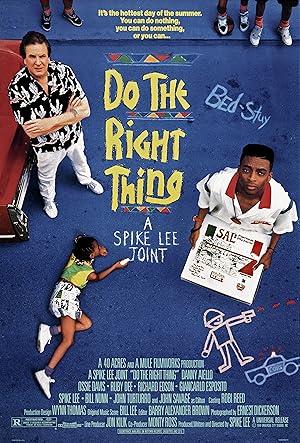
Do the Right Thing
Synopsis
Salvatore "Sal" Fragione is the Italian owner of a pizzeria in Brooklyn. A neighborhood local, Buggin' Out, becomes upset when he sees that the pizzeria's Wall of Fame exhibits only Italian actors. Buggin' Out believes a pizzeria in a black neighborhood should showcase black actors, but Sal disagrees. The wall becomes a symbol of racism and hate to Buggin' Out and to other people in the neighborhood, and tensions rise.
Critical Acclaim
Upon its release in 1989, Do the Right Thing garnered widespread acclaim for its bold storytelling and unflinching exploration of racial tensions in America. Directed by Spike Lee, the film was praised for its vibrant, provocative narrative and its powerful commentary on social issues. Critics noted Lee's unique ability to blend humor and drama, creating a film that was both entertaining and thought-provoking. The film quickly became a topic of conversation and debate, recognized for its timely relevance and artistic merit.
Critics like Roger Ebert lauded the film, giving it four stars and describing it as "one of the best films of the year," appreciating its honest depiction of racial and social dynamics. Vincent Canby of The New York Times called it "an extraordinary film," highlighting Lee's skillful direction and the film's aesthetic vibrancy. Modern reception remains overwhelmingly positive, with Do the Right Thing holding an impressive approval rating on Rotten Tomatoes, indicative of its lasting critical endorsement. The film's dynamic performances, particularly by Lee himself, Danny Aiello, and Ossie Davis, continue to receive praise for their depth and authenticity.
The legacy of Do the Right Thing is profound, influencing countless filmmakers and sparking important discussions on race and community. It was nominated for two Academy Awards, including Best Original Screenplay and Best Supporting Actor for Aiello. The film has been preserved in the National Film Registry by the Library of Congress for its cultural significance and remains a fixture on numerous "greatest films of all time" lists. Its impact endures, as it continues to be a critical reference point in both film studies and sociopolitical discourse.
Track your movie viewing progress at Your Watchlists